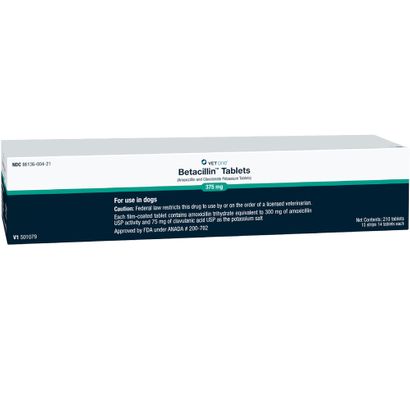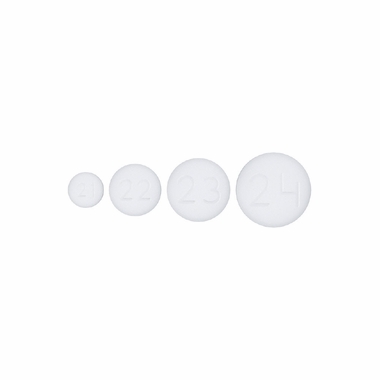SAVE 20% OFF 20% OFF Use Code PREZ20 *
Betacillin (Amoxicillin & Clavulanate Potassium) for Dogs & Cats , 375-mg, 210 tablets - [Antibiotic]
- Description
- Directions
- Reviews
Description
Betacillin Tablets are an orally administered formulation comprised of the broad-spectrum antibiotic amoxicillin trihydrate and the β-lactamase inhibitor, clavulanate potassium (the potassium salt of clavulanic acid).
Amoxicillin trihydrate is a semisynthetic antibiotic with a broad spectrum of bactericidal activity against many gram-positive and gram-negative, aerobic and anaerobic microorganisms. It does not resist destruction by ?-lactamases; therefore, it is not effective against ?-lactamase producing bacteria. Chemically, it is D (-)-α-amino-p-hydroxybenzyl penicillin trihydrate.
Clavulanic acid, an inhibitor of ?-lactamase enzymes, is produced by the fermentation of Streptomyces clavuligerus. Clavulanic acid by itself has only weak antibacterial activity. Chemically, clavulanate potassium is potassium z-(3R,5R)-2-β-hydroxyethylidene clavam-3-carboxylate.
Features:
- A trusted veterinary antibiotic proven effective for decades
- Combines the broad-spectrum antibiotic activity of amoxicillin with the unique β-lactamase-inhibiting effect of clavulanate potassium for antimicrobial activity
- FDA approved generic offers great value in savings and trusted standard of treatment
- Familiar packaging and dispensing envelopes for ease of clinic use
Indications
Betacillin Tablets are indicated in the treatment of:
Dogs: Skin and soft tissue infections such as wounds, abscesses, cellulitis, superficial/juvenile and deep pyoderma due to susceptible strains of the following organisms: β-lactamase-producing Staphylococcus aureus, non- β-lactamase-producing Staphylococcus aureus, Staphylococcus spp., Streptococcusem> spp., and E. coli.
Periodontal infections due to susceptible strains of both aerobic and anaerobic bacteria. Betacillin Tablets have been shown to be clinically effective for treating cases of canine periodontal disease.
Cats: Skin and soft tissue infections such as wounds, abscesses, and cellulitis/dermatitis due to susceptible strains of the following organisms: β-lactamase-producing Staphylococcus aureus, non- β-lactamase-producing Staphylococcus aureus, Staphylococcus spp., Streptococcus spp., E. coli, and Pasteurella spp. Urinary tract infections (cystitis) due to susceptible strains of E. coli.
Therapy may be initiated with Betacillin Tablets prior to obtaining results from bacteriological and susceptibility studies. A culture should be obtained prior to treatment to determine susceptibility of the organisms to Betacillin Tablets. Following determination of susceptibility results and clinical response to medication, therapy may be reevaluated.
Directions
Dogs: The recommended dosage is 6.25 mg/lb of body weight twice a day.
Skin and soft tissue infections such as abscesses, cellulitis, wounds, superficial/juvenile pyoderma, and periodontal infections should be treated for 5-7 days or for 48 hours after all symptoms have subsided. If no response is seen after 5 days of treatment, therapy should be discontinued and the case reevaluated.
Deep pyoderma may require treatment for 21 days; the maximum duration of treatment should not exceed 30 days.
Cats: The recommended dosage is 62.5 mg twice a day
Skin and soft tissue infections such as abscesses and cellulitis/dermatitis should be treated for 5-7 days or for 48 hours after all symptoms have subsided, not to exceed 30 days. If no response is seen after 3 days of treatment, therapy should be discontinued and the case reevaluated.
Urinary tract infections may require treatment for 10-14 days or longer. The maximum duration of treatment should not exceed 30 days.
Contraindications:
The use of this drug is contraindicated in animals with a history of an allergic reaction to any of the penicillins or cephalosporins.
Warnings:
Safety of use in pregnant or breeding animals has not been determined. Store at controlled room temperature, 68-77°F (20-25°C). Do not remove from foil strip until ready to use.










